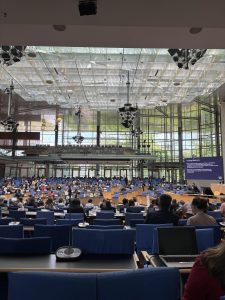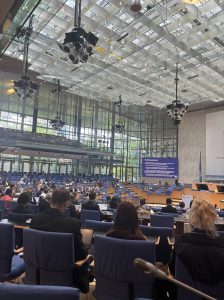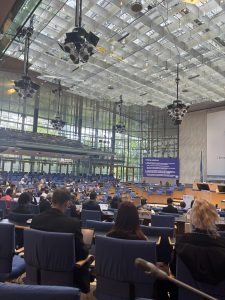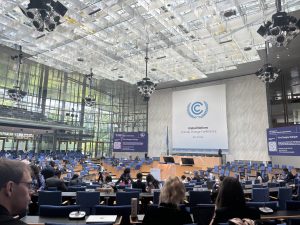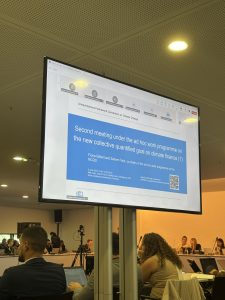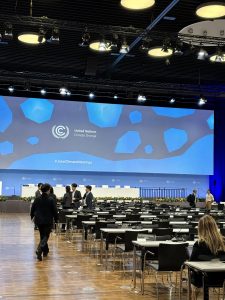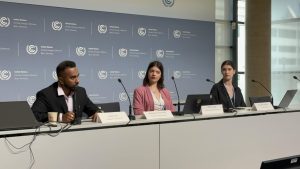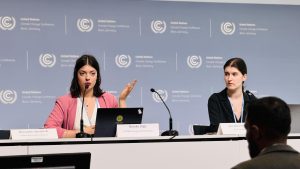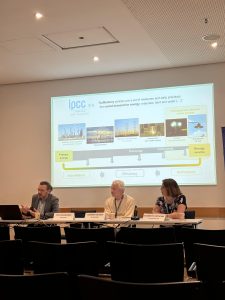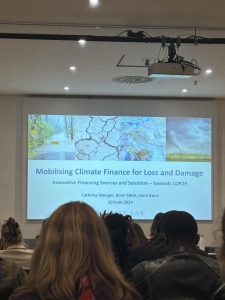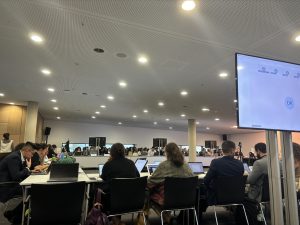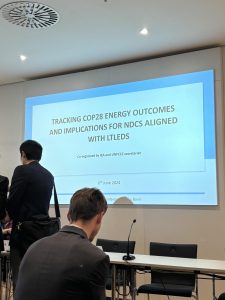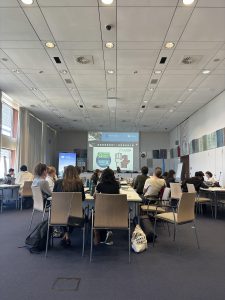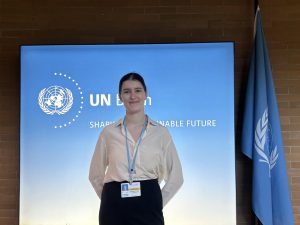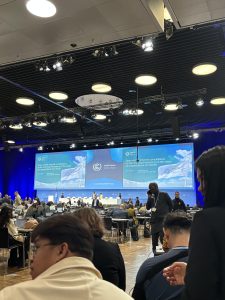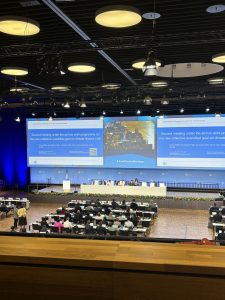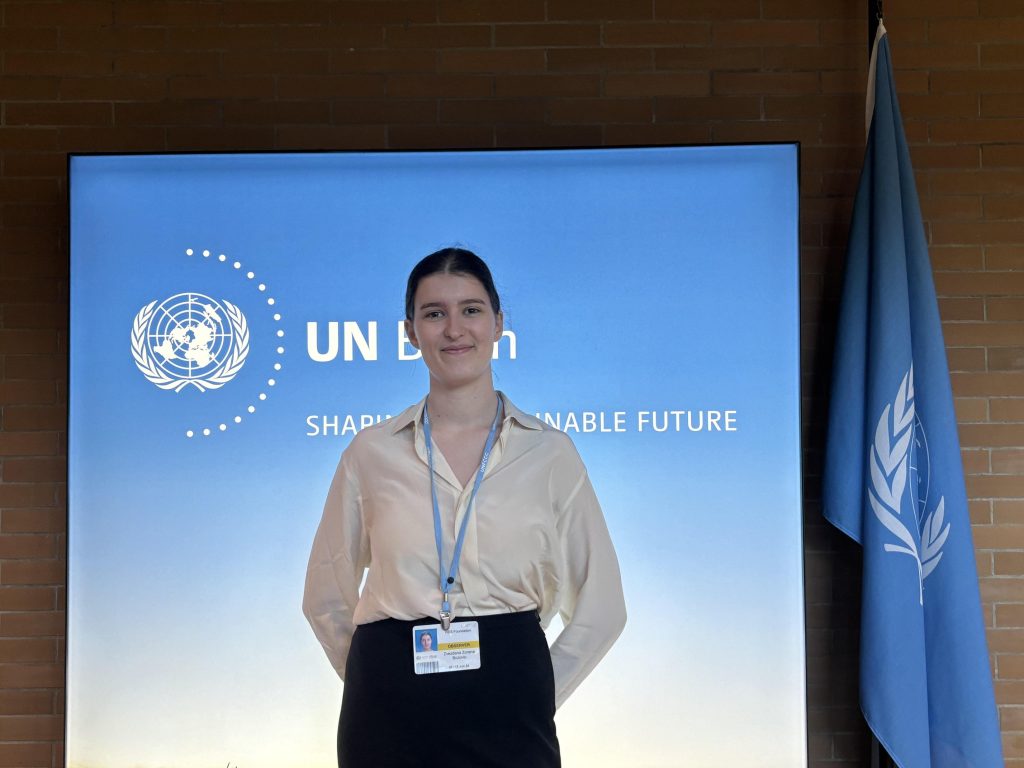
Author and photo credit: Zvezdana Božović
At this year’s SB60, the 60th Meeting of the Subsidiary Bodies to the United Nations Framework Convention on Climate Change (UNFCCC) held in Bonn from 3-13 June, RES Foundation had the opportunity to follow ongoing negotiations, meetings, and side-events and to speak on issues of energy poverty in Serbia and the Western Balkans.
Also referred to as the Bonn intersessional, the conference comprises of important meetings that take place each year between the Conferences of the Parties (COPs). It lays the groundwork for further negotiations at the COP. The 29th Conference of the Parties (COP29) will be hosted later this year in Baku, Azerbaijan. The agenda is split between two bodies – the SBSTA (Subsidiary Body for Scientific and Technological Advice) and the SBI (the Subsidiary Body for Implementation) which both tackle different points under the banner of the UNFCCC. This year, a major point on the agenda was the Second meeting under the ad hoc work programme on the new collective quantified goal on climate finance (also referred to as NCQG) which was followed by our delegate on the ground, Zvezdana Božović.
The side-events this year were varied, but several stood out. The side-event organized by the UNFCCC secretariat and the International Energy Agency (IEA) titled “Tracking COP28 energy outcomes and implications for NDCs aligned with LT-LEDS” gathered panelists from the IEA, the International Renewable Energy Agency (IRENA) and the current troika i.e. the previous, present and upcoming COP presidencies – United Arab Emirates, Azerbaijan and Brazil respectively. LT-LEDS are Long-term Low Emission Development Strategies that Parties submit to outline their plans for achieving low greenhouse gas emissions and climate-resilient development by mid-century. They provide a vision and direction for both short-term actions and Nationally Determined Contributions (NDCs). The panelists shared insights on energy transition plans, and policies and investment needs with emphasis on national contexts. The Global Stocktake (GST) decision emphasized the need for countries to enhance their renewable energy efforts and close the implementation gap, positioning NDCs as blueprints for economic and societal progress. Underlining its commitment to accelerating clean energy transition affordably and securely, the IEA emphasized its support to COP presidencies and talked about its progress tracking activities across all energy sectors via an open-access portal. In this regard, paragraph 28 of the UAE Consensus was lauded as a package that outlines key targets for energy transitions, as well as the importance of consumer focused clean energy subsidies and scaling up clean energy supply. The UAE emphasized the need for nationally determined measures and enhanced multilateral cooperation to limit global warming to 1.5°C, while Azerbaijan outlined the goals for COP29 which will focus on enhancing ambition and enabling action. Brazil stressed the importance of addressing financial inequalities in clean energy investments, with significant investments needed to achieve net-zero targets. Asami Miketa, speaking on behalf of IRENA, highlighted the importance of promoting best practices and quantitative assessments in the context of the alignment of long-term energy scenarios with LT-LEDS.
At the side-event organized by the International Network for Sustainable Energy (INFORSE) titled “Decarbonisation through sufficiency lifestyle: How much? How to support? 100% renewables” panelists from Fraunhofer ISI, SE/INFORSE and NégaWatt discussed sufficiency in policy and on household/lifestyle level. Sufficiency policies are a set of measures and daily practices that avoid demand for energy, materials, land and water while delivering human well-being for all within planetary boundaries. The idea behind sufficiency is to rethink activities, between the ceiling of environmental limits and the floor of decent living conditions. The goal is to ensure a fairer distribution of access to services within collective limits, and to balance needs and wants in the realm of energy services, by reinforcing needs and reducing wants. Panelists highlighted the crucial challenges of disentangling deprivation and sufficiency. According to literature, more than 330 sufficiency-related policies and measures have been identified already, and can make up a comprehensive set of proposals to develop an EU strategy for sufficiency. The identified policies outlined by Gunnar Olesen (SE/INFORSE) were focused on transport and mobility, energy, buildings and spatial planning, materials, products, food and cross-sectoral: information, taxation and finance. On this occasion, Elisabeth Dütschke (Fraunhofer ISI) presented the survey results of the FULFILL (Fundamental decarbonisation through sufficiency by lifestyle changes) research project supported by the European Union. FULFILL surveyed 9500 people in 5 EU countries, including 50 citizen initiatives, and 16 national policies which concluded that sufficiency lifestyle already exist in the surveyed countries, but are far from mainstream and need enabling infrastructures and societal debates in order to flourish.
At the side event organized by Nordic Cooperation and Perspectives Climate Group titled “The role of blended and innovative instruments in mobilizing climate finance in the context of the NCQG” panelists discussed new ways of utilizing existing financial instruments in the context of the NCQG negotiations which were going on at that exact moment. This timely panel shed a light on multiple perspectives from experts in the field, including on the study on Loss and Damage financing solutions and sources conducted by Wenger Law and the Nordic Council of Ministers. Cathrine Wenger (Wenger Law) spoke of the many different tools at our disposal including existing markets and mechanisms, the potential role of the private sector (including innovative finance mechanism such as debt swaps for climate), as well as the prospective role of taxation and levies, and the current landscape of insurance and reinsurance. Laila Darouich (Perspectives Climate Group) spoke of the potential role that export credit agencies (ECAs) could play in achieving goals set by the Paris agreement. She highlighted that ECAs are the largest class of G20 public finance institutions supporting the fossil energy sector, more than multilateral development banks (MDBs) or bilateral international financial institutions (IFIs), citing that ECAs provide an annual average of USD 32 billion between 2020-2022 to fossil fuels, six times more than for renewable energy. The relevance of ECAs for the NCQG is that they could provide finance to clean energy projects in developing countries in alignment with Art. 2.1(c) as climate finance, and could thus serve as key enablers for large-scale and long-term risky infrastructure projects.
Deliberations on the new collective quantified goal (NCQG) on climate finance started in 2022 and are set to conclude at COP29 later this year. The Ad Hoc Work Programme was launched at COP26 in Glasgow in 2021, while COP28 (decision 8/CMA.5) provided a procedural outcome for further negotiations on the NCQG. One common theme so far has been a great amount of text and a lesser amount of consensus on what it should contain. At the start of SB60 the input paper amounted to around 60 pages, shrinking with each subsequent meeting as Parties communicated their suggestions to the chairs on the necessary adjustments to the text. Some prominent points of divergence were on the degree of alignment of the existing text to the Paris Agreement and the UNFCCC, with multiple Parties stating that the text had gone beyond the scope of what was agreed in Paris and beyond the mandate of the UNFCCC. Additional points of divergence in opinions were on whether the NCQG should be a multilayered goal, as proposed by some, or a single-layer goal focused solely on developing countries’ needs. There was also a degree of disagreement over the balance and content of the text, with some Parties finding it imbalanced and overly narrative, while some emphasized the need to discuss substantive content without removing significant sections prematurely.
Parties also highlighted that focusing on the needs of developing countries should be paramount in the process and that finance must be grants-based and concessional. Calls for streamlining of the text were frequent and some Parties also highlighted that that focusing on the quantum should be the first step taken to make sure that the NCQG is fit for purpose. Many Parties also emphasized the urgency of establishing the NCQG and the need for transparency in its implementation and tracking, and there was broad agreement on maintaining principles like equity and fairness. The need for enhanced transparency and accountability mechanisms in tracking climate finance was also widely agreed upon. It now remains to be seen how far the NCQG will go at COP29.
The interlinkages between agenda points, particularly on NCQG, were also evident in the final Glasgow Dialogue on Loss and Damage, which had been running from SB56 in 2022, with some Parties calling for the integration of Loss and Damage into the NCQG in the form of a subgoal. This was particularly important as COP27 already delivered on the promise of the establishment of a dedicated Loss and Damage finance facility. However, to say that the expectations and the reality on the ground are vastly different would be an understatement. Hearing the Parties’ interventions (particularly from small island developing states (SIDS) and least developed countries (LDCs)), the urgency of the climate crisis and need for immediate climate finance has never been more evident. As such, loss and damage seems to have very much remained on the agenda of any and all financial deliberations. A particularly poignant and powerful intervention during the Glasgow Dialogue came from the delegate of Palau who shared his personal struggle during COP28 when a cyclone ravaged his home country, stating that “we needed support yesterday, not today, not tomorrow“, and underlining the need for consideration of non- economic losses of traditional knowledge, folklore and history, as well as the high toll of relocation on the mental health of local communities.
Energy was a common theme that permeated many side events, discussions and meetings. And yet, the lack of a dedicated negotiation track was noticeable. This is why RES Foundation took the floor at the joint press conference organized with the YOUNGO Energy Working Group and Young European Engineers to speak about the importance of formalizing energy through a dedicated negotiation track within the existing infrastructure of the UNFCCC process. Joined by Saikat Das (European Young Engineers) and Boróka Ürge (YOUNGO Energy Working Group), RES Foundation’s delegate Zvezdana Božović highlighted the importance of integrating local perspectives and civil society in these deliberations, underlining that “it is clear that there are vast discrepancies and an unequal distribution of access which means that clean energy is still neither affordable nor accessible to local communities” and that “we cannot lump Europe into one broad category – it is clear that even on continental level, there are gaps that need to be bridged.” Božović further emphasized, “the serious health implications of energy poverty, social implications of an unjust transition, and economic and environmental implications of a fossil—fueled future should all act as a reminder of what is at stake.”


